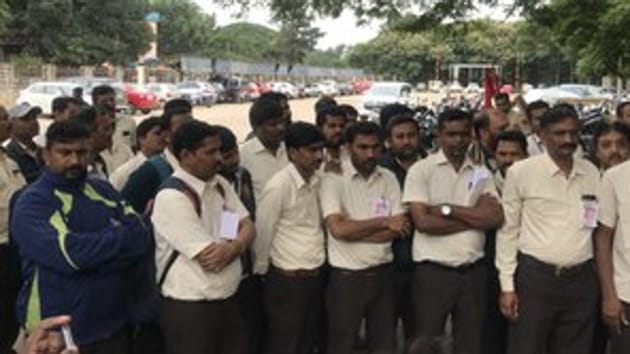HAL asks union, seeking wage revision, to call off strike in national interest
The All India HAL Trade Unions Coordination Committee (AIHALTUCC) had announced its decision to go on an indefinite strike on Monday. It had said then that it was forced to do so because of the “adamant/arrogant” attitude of the management of the company.
Hindustan Aeronautics Ltd asked its labour union to call off a proposed indefinite strike, set to begin October 14 against a deadlock in negotiations over a pending wage revision, keeping in view national interest and the setback the company will face should the union follow through.

The All India HAL Trade Unions Coordination Committee (AIHALTUCC) had announced its decision to go on an indefinite strike on Monday. It had said then that it was forced to do so because of the “adamant/arrogant” attitude of the management of the company.
Negotiations over a wage revision have been underway since 2016, as a new structure was to come in place on January 1, 2017. However, little headway has been made, with the management accusing the union of making unreasonable demands. The union has countered this alleging a disparity in the settlement offered to workmen as opposed to executives.
Responding to the union’s strike call, HAL issued a public statement on Friday, in which it said it had brought to public notice the “anomalies in the demands of AIHALTUCC”, and had sought co-operation “based on realistic and affordable expectations”.
HAL said the demands were not just against the guidelines set by the government for such negotiations, but acceding to the union would “also impact the competitiveness of the company”. In this light, HAL said, the strike “would neither be in the interest of the organization nor the employees”.
HAl said while salaries of workmen are revised every five years, and was last done in 2012, revisions for executives were done every 10 years. It said that a total of 10 meetings were held with the unions and four with the committee. “However, Unions have been insisting for more than 15% fitment benefit and 35% perks is more than that given to executives after a period of 10 years, whereas for workmen the last wage revision took place with effect from January 1, 2012.”
It said, when looked at along with the revision done five years ago, the percentage increase in workmen wages was higher than that of executives. “Time and again the Management has been explaining the position to the Unions but they have been adamant on their demands resulting in present stalemate,” it said.
“The proposed indefinite strike will have adverse repercussions on the performance of the organization in general and workmen in particular,” HAL said. “Further, in the interest of national security and the need to maintain the fleet serviceability of Armed Force, it is imperative that the workmen do not resort to such illegal strike and should settle for a fair and reasonable wage revision offered by the Management.”
Speaking to HT, Suryadev Chandrashekhar, general secretary of the committee, said the management was wrong because the revisions were only partial. “The government has set guidelines, where it has said that you can either go for 10-year periodicity or five years,” Chandrashekhar said. He added that many companies that had five-year periodicity had shifted to 10 and their managements hadn’t held the earlier revision against the workmen of those companies.
Chandrashekhar condemned the company’s invocation of national interest in the matter. “It is not required to say that, I don’t what the reason is for saying that. If their contention is that we are against the national interest, they are also equally responsible for this,” he said.
“It is our right to strike, it has been given by the Constitution,” Chandrashekhar said. “Whether the strike is illegal or not is not for the company to decide, after all it is not above the Constitution.”






